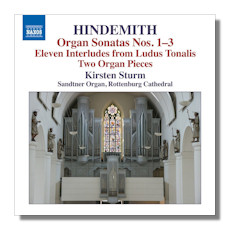
The Internet's Premier Classical Music Source
Related Links
- Hindemith Reviews
- Latest Reviews
- More Reviews
-
By Composer
-
Collections
DVD & Blu-ray
Books
Concert Reviews
Articles/Interviews
Software
Audio
Search Amazon
Recommended Links
Site News
 CD Review
CD Review
Paul Hindemith

Works for Organ
- Organ Sonata #1
- Organ Sonata #2
- Organ Sonata #3
- Two Organ Pieces
- Eleven Interludes from Ludus Tonalis
Kirsten Sturm, organ
Naxos 8.573194 72:03
Give this album a serious chance, organ fans. I wasn't sure about it at all, and after the first few notes, I wasn't convinced. It sounded like noise. But a closer listen reveals genius at work. For one, Hindemith's compositional skill is evident in every bar. Although not known for his organ writing, his expertise as a teacher and innovator is never in doubt. There's a wealth of color and expression here, aided by some fascinating harmonics.
Naxos talks up the three Organ Sonatas most of all, and they are indeed special. The inventive use of various stops is captivating; I love the different moods and tones that the composer conjures. While the notes talk about what he did and did not do for the organ, most of that is conjecture. He was not an organ specialist as was Reger, nor did he attempt to follow in the footsteps of Bach. He was an excellent composer, and pushed the boundaries of organ literature, just as he changed the landscape of music generally. Never a slave to fashion, these works are strictly secular and contain none of the quotations that Reger's massive output does. Nor are they intended as anything but concert music. Rather, these are quite symphonic works in nature, without being especially flashy.
Kirsten Sturm proves an able soloist on the very fine organ at Rottenburg Cathedral. She makes the Sonatas particularly interesting, some occasionally lumpish phrasing notwithstanding. The transcriptions from Ludus Tonalis are more curios than anything, but since the composer gets little attention for any of his keyboard works, we should be thankful that this piano cycle gets a facelift on the organ. Very good sound completes a desirable, if rather specialist package.
Copyright © 2014, Brian Wigman




















